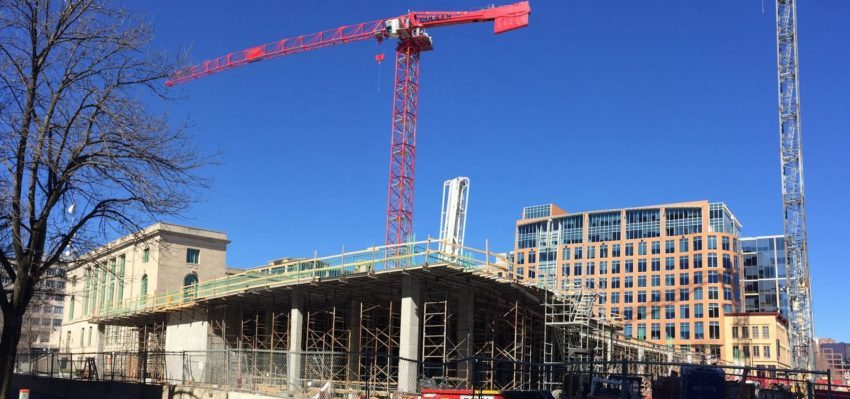 Madison City Council members recently had to be reminded — again — that, no matter how much they may want to, they cannot award building projects based on whether the bidder plans to hire a union shop. #wiright #wipolitics Click To Tweet
Madison City Council members recently had to be reminded — again — that, no matter how much they may want to, they cannot award building projects based on whether the bidder plans to hire a union shop. #wiright #wipolitics Click To Tweet
MacIver News Service | June 19, 2019
By M.D. Kittle
MADISON, Wis. — Some liberal lawmakers still can’t seem to accept Wisconsin’s worker freedom laws.
And plenty of unions refuse to.
Local and state governments can no longer do what they had long done: grant construction contracts exclusively to contractors that employ union workers — or make union membership a condition of employment.
Madison City Council members recently had to be reminded — again — that, no matter how much they may want to, they cannot award building projects based on whether the bidder plans to hire a union shop.
In a memo sent last week, Assistant City Attorney Kevin Ramakrishna informed Madison Mayor Satya Rhodes-Conway and the council’s Finance Committee that Wisconsin has a law on Project Labor Agreements. PLAs are government public construction projects awarded exclusively to unionized firms.
As of 2017, PLAs are illegal under state law, Ramakrishna pointed out.
“The City Attorney’s Office issued a Memorandum on April 17, 2018 discussing the impact of the legislation,” the attorney wrote. Apparently some city council members in this uber-liberal city didn’t get the memo — figuratively, that is.
“The advice therein continues to be accurate, and, as related to the Judge Doyle project, the City cannot require a union workforce, set labor rates, or enforce similar provisions through best value contracting,” Ramakrishna advised.
Among the many provisions of a reform law that levels the playing field for contractors and better protects taxpayers is a clear prohibition on requiring a project bidder to “enter into or adhere to an agreement with a labor organization.”
In other words, local and state governments can no longer do what they had long done: grant construction contracts exclusively to contractors that employ union workers — or make union membership a condition of employment.

In considering three bids for the downtown, mixed-use Judge Doyle Square project, a city negotiating team liked what they saw in a plan by Stone House Development of Madison. At $40 million, it came in lower than the $52 million bid by fellow Madison firm Gebhardt Development, and a little above the $38.2 million bid by Milwaukee-based Mandel Group.
Big Labor took issue with the negotiating team’s preference.
Andrew Disch, political director for the North Central States Regional Council of Carpenters, said city staff employees, in recommending Stone House, “glossed over” the development firms’ hiring and compensation plans, according to a story published late last month at DailyReporter.com.
In short, Stone House said it would bring on a nonunion construction company. Mandel, according to Disch, would hire a union builder. His assertion is that the unionized contractor would pay a better wage than the nonunion company—something, Disch said, the city needs to consider in its selection process.
“Taking up some of these concerns, members of Madison’s Finance committee … asked each of the competing developers to explain its plans for employing apprentices on the project, hiring a diverse workforce and paying workers fair wages,” reported Nate Beck, of the Daily Reporter, a trade publication for the construction industry.
Ultimately, the city’s Finance Committee voted to recommend the more costly Gebhardt bid for two reasons: The developer’s plan included the most affordable housing units, and bald-faced greed. Gebhardt’s proposal comes with a higher estimated value, and higher property valuations mean more property tax take for the city.
The full council was expected to take up the recommendation at Tuesday’s meeting.
“However, selecting a developer primarily based on a unionized workforce is no different than having a policy to that effect, which would be illegal,” the attorney’s memo states.
Ramakrishna, the assistant city attorney, advised that nothing forbids the city from considering a company’s “positive labor relations policies as a positive factor, among many others,” in choosing a developer.
“However, selecting a developer primarily based on a unionized workforce is no different than having a policy to that effect, which would be illegal,” the attorney’s memo states.
It’s clear Disch, the Carpenters Union rep, wants Madison officials to shape its decision on what he asserts is higher compensation levels for union-represented contractors. It seems city officials were of like mind. And it appears to be a pretty significant consideration for both.
Big Labor-friendly Madison has walked a thin line on the law.
“This validates why the (PLA) issues had to be addressed. You have these activist Common Council members in these local communities predisposed to structuring contracts at the disadvantage of others,” said state Rep. Rob Hutton (R-Brookfield), who co-authored the Project Labor Agreement reform laws.
Hutton noted that the law doesn’t pit union contractors against open shops. State statutes prohibit discrimination of any kind in awarding public construction contracts. Governments are not allowed to select bids based on union or non-union status of the competing companies.
Municipalities still have the ability to set goals for employee and subcontractor diversity standards.
“But the irony here is we have communities talking about diversity and inclusion and not alienating anyone and right off the bat they are discriminating against half of the companies because they are not union,” Hutton said.
“There is a hypocrisy of what they claim to be supporting,” the lawmaker added. “Construction workers should have an equal opportunity to make a living, to use their gifts and abilities, and cities shouldn’t be picking winners and losers” through union preferences.
While Wisconsin’s worker freedom laws were designed to protect all workers, enforcement has been hard to come by. Hutton has concerns the state Department of Justice, led by a Big Labor-friendly attorney general whose political campaign was abundantly funded by unions, isn’t taking seriously violations of the PLA law.
As MacIver News Service reported earlier this year, it appears Wisconsin’s four-year-old right-to-work law is still being violated by union shop businesses.
In two cases to go before the Wisconsin Employment Relations Commission (WERC), the agency that oversees the state law deferred to the National Labor Relations Board.
Union Shops Still Violating Right-To-Work Law, With Impunity
Hutton worries enforcement agencies turning a blind eye to violations will only embolden offenders.
Ultimately, worker freedom suffers, but so do taxpayers.
“Anti-competitive project labor agreements (PLAs) are special interest schemes that end open, fair and competitive bidding on public works projects,” asserts the Associated Builders and Contractors Inc., a national construction industry trade association serving some 21,000 merit and open shop members. “PLAs drive up the cost of construction by reducing competition and effectively excluding merit shop contractors and their skilled employees from building projects paid for by their own tax dollars.”